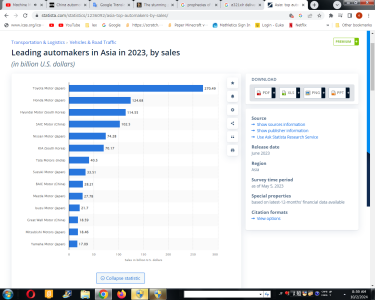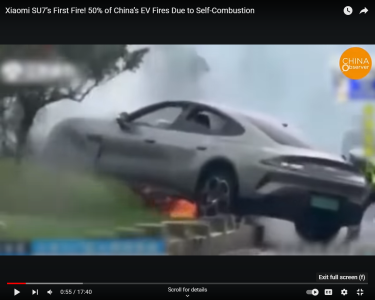- Joined
- Jul 3, 2024
- Messages
- 511
- Likes
- 1,003
Volkswagen weighs another plant closure, this time in China as domestic EVs take control
11 Comments
Volkswagen weighs another plant closure, this time in China as domestic EVs take control
11 Comments





The issue of EVs catching fire, whether after collisions or even spontaneously, has gained significant public attention. According to Chinese state media, in 2023, over 270 reported cases of electric vehicle fires occurred across China. Of those, only about 10 percent were due to collisions, while over 50 percent were caused by incidents during charging or while the vehicles were stationary
View: https://www.youtube.com/watch?v=zdz76lHYpms
View attachment 11007
a person has only one life, a fire on a car is easy to say if we are not inside it.By 2023, the registered number of new energy vehicles in China has exceeded 10 million.
There are over 600 cities in China,
By 2023, the registered number of new energy vehicles in China has exceeded 10 million.
There are over 600 cities in China,

 carnewschina.com
carnewschina.com



a person has only one life, a fire on a car is easy to say if we are not inside it.
my advice is do not try to cheat in quality, and do not try to cheat when you exportMy advice is to stay away from cars and use horse-drawn carriages

my advice is do not try to cheap in quality, and do not try to cheap when you export
let private companies in China be free and then we are going to let our consumers choose freelyLet the consumer choose freely,
The market is full of cars at all prices
let private companies in China be free and then we are going to let our consumers choose freely
no you are very wrong, consumers like cheap goods but governments also need to keep people working, thus seeIn fact, consumers now love Chinese EVs

no you are very wrong, consumers like cheap goods but governments also need to keep people working, thus see
A recent report on nearshoring by Moody’s identified a number of announcements by auto companies, including foreign OEMs, regarding plans to invest in Mexico. “The automotive sector is a key player in expressions of interest to expand in Mexico by companies such as Tesla, BMW, Ford and GM, along with Asian manufacturers including BYD and Kia,” Moody’s noted.
Mexico’s government reported $36 billion of foreign direct investment in 2023, a 27% increase over the previous year. In 2024, through mid-year, that figure was $31 billion, a new record, according to the government.
Trump has threatened to impose a 100% tariff on vehicles made in Mexico. During the recent presidential debate, he renewed claims he has made in the past about Mexican manufacturing linked to China. “They’re building big auto plants in Mexico, in many cases owned by China. ... They’re building these massive plants, and they think they’re going to sell their cars into the United States because of these people [Biden administration],” Trump said.
the voters say in the USA MAGAThe consumer is always right



